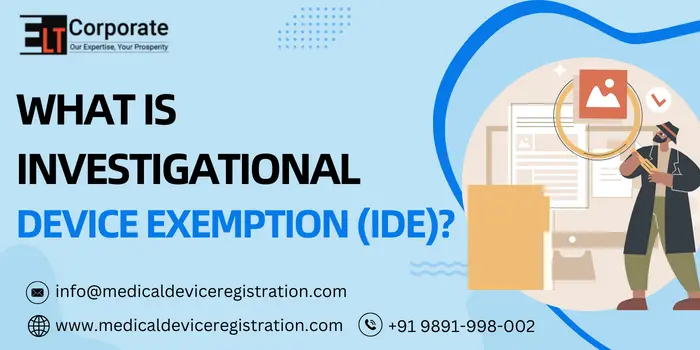If you are confused and searching for the answer of what Investigational Device Exemption is, so basically is widely known as an “IDE,” here is your answer. In simple terms, The IDE is a Regulatory Submission that works as a permit for the investigational device to be used in medical device study. This medical study helps in collecting all the critical data, which makes the IDE process really essential. For more details about Investigation Device Exemption, check out the blog, as everything from start to end is mentioned here.
Why Is An Investigational Device Exemption (IDE) Needed?
Indeed, The Investigational Device Exemption (IDE) is needed for researchers and companies to conduct trials on Human Subjects in controlled conditions. This procedure helps make sure medical devices are effective and safe before they come into contact with the public.
Who Needs To Apply For An Investigational Device Exemption (IDE)?
Any person who is a manufacturer or sponsor needs to apply for an Investigational Device Exemption (IDES), whichever wishes to lead clinical studies on any medical device and wants to make any modification to an already existing medical device.
What Documents are Required for the Investigational Device Exemption?
All the needed documents for the IDE are mentioned below:-
- Cover letter
- Table of contents
- Investigator agreement example
- Investigator list
- Certification of investigator agreement
- IRB list
- Participating institutions list
- Sale information
- Investigators’ certification of financial interest
- Form FDA 3674
- eCopy of submission
- Labeling
- Study monitoring
- Required records and reports
- Device information
- Intended use
- Sponsor-investigator information
- IRB-approved investigational plan
- Informed consent
- Justification for waivers
- Referenced files
- Sponsor name and address
- Prior investigation report
- Device manufacturing, processing, packing, storage, and installation description
What Is The Purpose Of An IDE Application?
The purpose of the Investigational Device Exemption (IDE) application is to distribute all the crucial or necessary information about the medical device, its intended use, pre-clinical test data, manufacturing process reports, and all the proposed medical data to the Food and Drug Administration (FDA), Click it if you don’t know what does FDA Means or if you want more details about it. Basically, the FDA helps check medical devices to ensure that they are practical and can be used by humans or the local public. It also evaluates that manufacturers followed all the rules.
What Does The IDE Application Include?
The Investigational Device Exemption (IDE) Application includes detailed information about the clinical device. This Investigational Device Exemption study application required this kind of information: device manufacturing process, the device’s intended use, the design, and the material. It also checks whether they follow the law, how many members or participants are involved in the process, the monitoring process, and the duration of the study.
What Happens After An IDE Is Approved?
It is pronounced that after the approval of the Investigational Device Exemption, researchers can start a medical study on clinical devices. After approval for IDE, one should ensure that all the protocols are followed and that they comply with FDA standards for the safety of humans.
Are There Different Types Of Investigational Device Exemption (IDEs)?
Yes, there are three types of investigational device exemptions. Check out the different types of IDEs.
- Original IDE
- Supplement IDE
- Emergency Use IDE
What Are The Responsibilities Of The Sponsor During An IDE Process?
The primary responsibilities of the Sponsor during the Investigational Device Exemption process are to ensure the medical device safety and well-being of the participants and to report any detrimental events or other kinds of things like student deviation to the FDA.
How Does The FDA Evaluate Investigational Device Exemption Applications?
Evaluation of the Investigational Device Exemption application by the FDA is checked on the basis of scientific assessment of the given studies, the safety and effectiveness of the medical device, and the security or protection of the human subjects for the procedure.
What Happens If An IDE Study Shows Positive Results?
If the Investigational Device Exemption study shows positive results, then sponsors can make use of the data to help with marketing approval, like pre-market approval in short PMA.
Conclusion
Investigational Device Exemption (IDE) is a crucial step for testing new medical devices. It ensures they’re safe and effective before reaching the public. With various types of IDEs available, sponsors need to follow FDA rules to protect study participants. Positive results from IDE studies can lead to marketing approval for these devices, benefitting everyone.
What does IDE stand for in the FDA?
IDE stands for the Investigational Device Exemption in FDA.
How long does IDE approval take?
Generally, IDE takes up to 60 days for approval.

